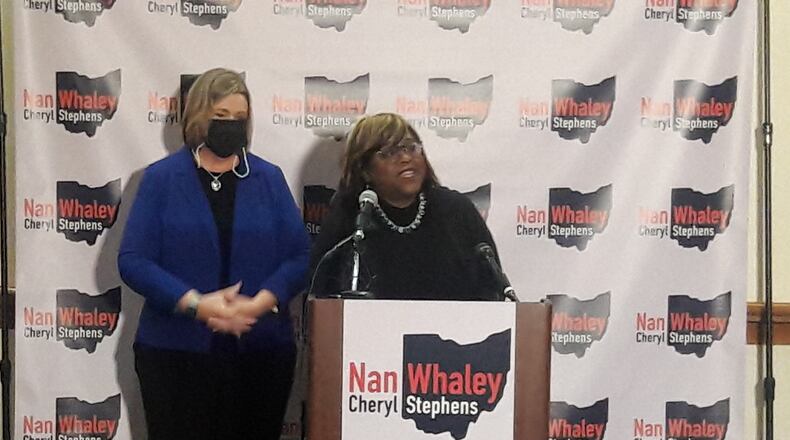Whaley’s pick for lieutenant governor was elected to Cuyahoga County Council in 2018, and previously served as mayor of Cleveland Heights.
Stephens has focused on economic development and services for veterans, seniors and families, according to her official biography. She holds a Master’s degree in public administration from the University of Dayton.
Stephens is the chief executive officer of the East Akron Neighborhood Development Corporation and previously was director of acquisition, disposition and development at the Cuyahoga County Land Bank for eight years.
Stephens’ father spent his career in the U.S. Air Force, meaning the family moved frequently.
“Almost every year I attended a new school when I was growing up,” she said. His final station was Wright-Patterson Air Force Base.
As mayor of Cleveland Heights, Stephens oversaw creation of a $4 million budget surplus, and on Cuyahoga County Council she has pushed banks to support homebuyers and small businesses, she said.
Stephens said she has spent most of her career in community economic development and housing, and particularly wants to build more housing for veterans.
When Whaley asked her to join the ticket, she said no at first — but that she would like to become director of the Ohio Department of Development, she said. Whaley countered by offering both posts.
Whaley said it’s not uncommon for lieutenant governors to hold other cabinet-level posts, and that local officials statewide know Stephens from her extensive work with land banks and development agencies.
Columbus Mayor Andy Ginther introduced Whaley at a news conference in the Sheraton Columbus Hotel at Capitol Square, across from the Ohio Statehouse. He said her recent tenure as president of the U.S. Council of Mayors was instrumental in the passage of recent federal legislation that sent billions of federal dollars to Ohio.
Whaley touted her support from U.S. Sen. Sherrod Brown, D-Ohio; many state elected officials; unions and progressive groups; and And fundraising haul of $1.64 million in the first half of 2021. That’s the most ever raised in the period by a Democratic gubernatorial challenger in an off-year, she said.
“I’m the only candidate in this race who is not a millionaire, so this campaign is driven by grassroots donations,” Whaley said.
For 30 years “the same people” have run Ohio, watching the state decline while enriching themselves, she said.
Whaley listed several priorities for her potential administration: making sure “one good job is enough,” including a state minimum wage of $15 per hour; only giving incentives to companies that pay fair wages and treat workers with respect; and building clean energy technology in Ohio.
She also wants to expand preschool to help lower childcare costs, strengthen trade schools and ensure the wealthy and corporations “pay their fair share” of taxes, she said.
Stephens cited three principles for the campaign and administration: that every child should have access to a good public education, everyone should be able to find a job paying a decent wage, and should be able to buy a house and leave their children better off.
“Unfortunately I’ve seen that dream moving further and further away from the average people of Ohio,” she said.
Five hours after Whaley’s announcement and just yards away, Cranley introduced Fedor in Columbus. Standing in a cold gusty wind on the sidewalk across from the Statehouse, Cranley said he’s the only gubernatorial candidate who has overseen a real turnaround in a declining major city.
Cranley pledged to create jobs paying $60,000 per year for people who didn’t go to college, extend broadband internet statewide, legalize marijuana, and improve air and water quality.
Fedor said Republican administrations have steadily defunded local governments and unconstitutionally underfunded schools, spending taxpayer money on their own big donors.
Hearing that Whaley criticized Fedor for voting in favor of House Bill 6 (an energy bill now at the center of a nearly $61 million bribery scandal and a criminal investigation), Cranley said he has challenged Whaley to a debate but she refused.
“Instead of debating me, she takes a shot at Teresa Fedor,” he said.
In response, Whaley campaign manager John Hagner sent a brief statement.
“Nan looks forward to sharing her vision for why Ohio deserves better in debates after the filing deadline passes,” he said. “Right now, she is focused on meeting voters in person across the state and hearing directly from them about how we can move Ohio forward together.”
The filing deadline is Feb. 2.
Fedor said she regrets voting for the bill now that its background is known.
“I voted for the jobs, for those families that were in my district,” she said.
Cranley said when he filed suit against the utility rate hikes included in HB 6, as Dayton’s mayor, Whaley didn’t join until months later. Nor did she immediately join in seeking to have the state’s public utility commissioners fired, as he called for, Cranley said.
Cranley said abortion rights will be on the ballot this year, and that he wants DeWine or Husted to face Fedor on a debate stage and say whether she or her doctor should be in jail. Fedor has spoken openly about her own abortion following a rape.
Ohio Republican Party Chairman Bob Paduchik released a statement Wednesday morning denouncing both choices as “far-left.” He blamed the Democratic gubernatorial candidates for crime and poverty.
Stephens responded to the accusation with laughter.
“Left? Did you hear that my dad was in the United States Air Force?” she said. Stephens said she grew up around soldiers, who are not noted for their leftist beliefs.
Instead she depicted the Whaley-Stephens campaign as focusing on issues common to all Ohioans.
“If there’s anything that is conservative, it is the American Dream,” Stephens said.
They are running against at least three Republican opponents, including incumbent Gov. Mike DeWine. The major parties’ respective standard-bearers will be determined in the May 3 partisan primary.
About the Author

